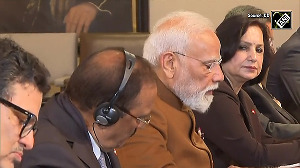Schemes like the Mukhyamantri Majhi Ladki Bahin Yojana strain Maharashtra's fiscal resources amid rising unemployment and prices of food items.

Two prominent leaders from Maharashtra, including a Union minister from the ruling alliance, have tried to highlight the reality of one of the state government's popular schemes -- the Mukhyamantri Majhi Ladki Bahin Yojana (MMLBY).
Union Road Transport and Highways Minister Nitin Gadkari cautioned the industry last month against relying too heavily on subsidies and grants as the state government also needed funds for schemes like MMLBY.
Maharashtra Navnirman Sena chief Raj Thackeray, on the other hand, told journalists that the state's coffers would run dry after the October instalment of MMLBY is issued, and the government may not have enough funds to pay salaries to its employees and officials starting in January.
Raj Thackeray said it would have been more beneficial if the state government had focused on providing jobs instead.

Thackeray's remarks hold some weight, as the unemployment rate in Maharashtra stood moderately higher at 3.3 per cent in 2023-24 (July-June) than the national average of 3.2 per cent.
The unemployment rate in the state inched up from 3.1 per cent the previous year, while the all-India rate remained unchanged, according to the Periodic Labour Force Survey (PLFS), which is known for underestimating unemployment figures.
Taking a cue from the CM's Ladli Behna Yojana, which received a favourable response during Madhya Pradesh's assembly elections last year, the Eknath Shinde government introduced MMLBY earlier this year.
This initiative pledges Rs 1,500 per month to eligible women aged 21 to 65 years, adding an annual burden of Rs 46,000 crore (Rs 460 billion) to the state's finances.
The government has promised to double this amount to Rs 3,000 per month.
Due to the hectic election activities, the government paid the November instalment a month early.
Maharashtra will go to polls on November 20, with results announced three days later.
MMLBY is one of several incentives announced by the Mahayuti government in the supplementary Budget for 2024-2025 in a bid to woo voters who sent 30 out of 48 MPs in Maharashtra from the Opposition Maha Vikas Aghadi in the 2024 general elections.
The Budget also includes provisions for three free cooking gas cylinders per family per year, waiving electricity dues for farmers, and a Rs 10,000 stipend for youth skill training.
Despite these initiatives, state finances are projected to remain stable. The Interim Budget for FY25 was already presented in February.
These measures, coupled with adjustments in other areas, are expected to increase revenue expenditure to Rs 5.19 trillion, a 2.16 per cent rise from the Interim Budget's Rs 5.08 trillion.
Capital expenditure, slightly adjusted, stands at Rs 92,779 crore (Rs 927.79 billion), compared to Rs 92,030 crore (Rs 920.30 billion) in the Interim Budget.
This careful calibration ensures that the proportions of revenue and capital expenditures to total expenditure as well as capex as a percentage of gross state domestic product (GSDP) remain consistent with the past nine years' trends, avoiding any significant deviations.
However, in recent years, 80 to 90 per cent of total expenditure has gone towards revenue expenditure.
Besides, only a portion of capital expenditure contributes to asset generation, termed capital outlay.
The state's tax revenues are projected to remain steady at Rs 3.4 trillion, maintaining it at 68.7 per cent of revenue receipts.
While this figure is consistent with trends over the past nine years, a closer look reveals a marginal decrease to 68.68 per cent from the Interim Budget's 68.78 per cent.
The strategic spending increase has widened the revenue and fiscal deficit targets vis-a-vis the Interim Budget.
The revenue deficit is expected to more than double to Rs 20,051 crore (Rs 200.51 billion), up from Rs 9,734 crore (Rs 97.34 billion) in the Interim Budget, while the fiscal deficit is projected to reach Rs 1.1 trillion, compared to Rs 0.99 trillion.
In terms of percentage of GSDP, the revenue deficit would slightly widen to 0.5 per cent for FY25 against the 0.3 per cent projection in the Interim Budget, and the fiscal deficit to 2.6 per cent against the earlier 2.3 per cent projection.
States can keep their fiscal deficit up to 3.5 per cent of GSDP with 0.5 per cent linked to power sector reforms.
Last month, the state government had also announced toll waivers for light motor vehicles at all five toll booths in Mumbai. This may also slightly affect the revenues of the state.
Per capita income in the state has been much above the national average for the last nine years. However, the excess gap has declined from 2017-2018 for three years.
Although it has started to rise, even the estimated per capita income in the state would be one-and-a-half times the national average in 2023-2024, which is moderately less than in the first two years of the period under review.
For the electorate, rising prices are of utmost concern. Overall price pressures have come down in the state during the first six months of the current financial year, in line with national trends.
Maharashtra witnessed lower inflation than the all-India level during this period.
However, what matters more for the common man is the prices of food items.
Maharashtra had an elevated rate of price rise for food and beverages at 7.1 per cent during April-September, which is the same as the all-India average.
However, September saw food and beverages inflation at 8.9 per cent in Maharashtra, higher than 8.4 per cent at the all-India level.
Rural parts of Maharashtra saw this inflation rate at 9.1 per cent and urban parts at 8.4 per cent.
Feature Presentation: Aslam Hunani/Rediff.com











